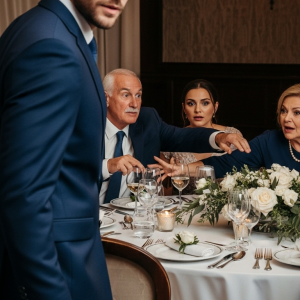My name is Margaret Collins. I am 59 years old, a widow, and I have spent most of my adult life ensuring my two children, Emily and Luke, never had to struggle the way I did. Last Tuesday, I received an email that changed everything. The subject line was blank; the sender was Emily. I smiled, assuming it was a quick note about her upcoming wedding. I had, after all, just contributed $30,000 for the venue, photographer, and the florist she’d dreamed of since college.
But when I opened the email, the smile vanished from my face. “Mom,” it began, not “Dear Mom,” just my title, like a label. Emily explained that she, her fiancé Andrew, and his family had finalized the guest list. After much thought, they decided it was best for me to watch the wedding via livestream, not in person. Andrew’s mother, she wrote, was particular about the guest count and wanted to keep things “intimate.” The email ended with a line that felt like a deliberate twist of the knife: “If you want to be a part of it, you can watch through the Google Meet link we’ve created. Should be just like being there. LOL.”
I stared at the screen for a long time. My coffee grew cold. I didn’t cry. I didn’t tremble with rage. Instead, something inside me quietly cracked open, and a profound, chilling clarity settled in its place. I typed back just four words. “Sure. Enjoy your big day.” No emotion, no argument. I knew, deep down, that those four words would echo louder than any scream. That was the day I stopped pretending my sacrifices meant anything to my daughter. That was the day everything began to change.
How did we get here? After my husband died, I worked eighteen years as an office manager to give my children stability. I didn’t think twice about giving up my own life. Every penny I saved went to them. When Emily changed majors twice and needed more tuition, I paid. When she moved to New York for a job, I covered her deposit. When Luke wanted to buy a house, I co-signed the mortgage and gave him the first $10,000 without hesitation. I never kept score. That’s what mothers do. But that email made me feel like a transaction whose shelf life had just expired.
At the office, my boss, Robert, noticed something was off. He’s a kind man who remembers how you take your coffee. He placed a latte on my desk. “You look like you’ve seen a ghost,” he said. I wanted to tell him my daughter had just disinvited me from her wedding. Instead, I smiled and said I hadn’t slept well. That small act of kindness—the coffee, his gentle silence—nearly undid me. It was a quiet reminder that I still mattered.
After work, I didn’t go home. I drove to the bank. Carlos, the branch manager, greeted me by name. “Mrs. Collins, what can I do for you today?” My voice was calm, almost too calm. “I need to cancel a wire transfer. The one to the Napa wedding venue.” Carlos hesitated. “Are you sure, Mrs. Collins? The next transfer is for $50,000.” Fifty thousand dollars. That was the amount I had planned to send, on top of the $30,000 already gone. Eighty thousand dollars for a wedding I wasn’t allowed to attend. “I’m sure,” I said. I signed the forms and left the bank without a second thought.
By the time I got home, there were nine missed calls from Emily and two from Luke. I turned off my phone, poured a glass of wine, and sat on my porch in the fading light. The memories came in waves: all the birthdays I planned alone, the new shoes I didn’t buy, the vacations I postponed. I thought about Andrew’s mother, a woman whose opinion carried more weight than thirty-two years of my own motherhood. I thought about Emily’s “LOL,” as if watching your daughter’s wedding through a screen was a joke. And for the first time, I thought about myself—not as a mother, but as a woman. What did I want? Peace. Dignity. A life that didn’t revolve around being useful to people who only called when they needed something.
Around 9 p.m., the doorbell rang. It was Luke, my son, looking agitated. “Mom,” he said, stepping inside. “Why aren’t you answering your phone? Emily’s freaking out. She says you’re not coming to the wedding now. That you’re being difficult.” I laughed, a short, bitter sound. “Difficult? For declining an invitation I never received?” He shifted uncomfortably. “Andrew’s parents are footing most of the bill, Mom. You know how traditional they are.” “Traditional? I’ve already paid thirty thousand dollars. I was about to give fifty thousand more. That’s not tradition, Luke. That’s a fee.” He froze. “Wait, you were sending another fifty?” “Was,” I said, sipping my wine. “But not anymore.” His face went pale. “Mom, they’re counting on that money!” “Not my problem anymore,” I said evenly. His voice rose. “Of course, it’s your problem! She’s your daughter!” “And I’m her mother,” I replied quietly. “A mother who was told to stay home and watch from a screen.” He ran his hands through his hair. “You always make everything about yourself.” And that was it. That was the line. “Get out of my house.” “What?” “You heard me, Luke. Get out.” He stood there for a moment, then turned and walked out. The door clicked shut quietly, but it felt louder than any slam. I stood in my living room, heart pounding, and realized something startling. I didn’t feel guilty. I felt free.
The next morning, I woke up to a barrage of frantic messages from Emily. They began with guilt, then shifted to panic. “The venue just called. The payment didn’t go through. We’re going to lose everything if we don’t pay by tomorrow. Andrew’s parents are furious. They said this proves they were right about you.” And finally, at 3:24 a.m.: “I don’t understand why you’re doing this to me.” I smiled into my coffee. Of course, she didn’t understand. She had grown up with my sacrifices so seamlessly woven into the fabric of her life that she never questioned where the comfort came from. She just assumed I would always be there to provide it.
Later that morning, another email arrived. Subject: Please don’t ruin my wedding. “Mom,” she wrote, “I know you’re upset, but this is extreme. Andrew’s parents are beyond upset. Please don’t do this. We can talk about you attending the ceremony, but we need the funds first.” There it was. Not an apology. A negotiation. My presence at my own daughter’s wedding was a bargaining chip, available for purchase once the funds were secured. I didn’t respond.
At lunch, I confided in my boss, Robert. I told him everything. He didn’t judge or offer solutions. He just listened. “Sometimes the hardest part of love is setting boundaries,” he said gently, “especially with the people we’ve given the most to. I think you did the right thing.” For the first time in a long time, I believed it, too.
That evening, someone was sitting on my front steps. It was Sophia, Emily’s best friend since childhood. She had spent countless weekends at our house. I invited her in for tea. “Emily’s a mess,” Sophia said, her voice low. “They lost the venue. The florist dropped out. Andrew’s parents are threatening to cancel everything. She knows she messed up. She just doesn’t know how to fix it.” “Is that why you’re here?” I asked. “To fix it for her?” Sophia shook her head. “No. I’m here to ask. Is there anything she can say or do to change your mind?” I paused, thinking. Would an apology erase the casual cruelty? Would it change the fact that they saw me as a bank account first and a mother second? “No,” I said quietly. “There isn’t.” Her shoulders sagged. “Not even if she apologizes?” I handed her a mug of tea. “Words are easy, Sophia, especially when people are desperate. The people who truly love you, they don’t wait until you cut them off to see your worth.” Sophia looked down into her tea, nodding slowly. “I get it,” she said. “Even if she doesn’t. I’m sorry, Mrs. Collins.” She didn’t stay long. She hugged me gently and walked back into the night. And as I closed the door, I felt like I was finally closing the door on a version of myself I had long outgrown—the woman who would do anything to be needed.
The wedding never happened, not as they’d planned. They scrambled and ended up with a small backyard ceremony weeks later. I wasn’t invited, and for the first time, that was okay.
In the weeks that followed, Emily sent one last long, emotional email—half apology, half justification. I read it once, then archived it. I wasn’t angry anymore. I was just done. A strange peace comes with letting go, not in rage, but in clarity.
For the first time in decades, I woke up not wondering who needed something from me. I made a new rule for myself: If my presence is negotiable, then so is my effort.
I go to work. I read novels. I joined a pottery class. I have dinner with friends who see me, not what I can give them. A few months ago, I started dating a kind gentleman from my book club. We travel on the weekends, exploring the small coastal towns I always dreamed of visiting. My life is finally my own.
I’ve learned something I wish I’d known sooner. You don’t have to set yourself on fire to keep others warm. Sometimes, the strongest and most important kind of love is the one you finally, after a lifetime of waiting, give to yourself.
The weeks after Emily’s backyard wedding passed quietly, almost too quietly. For the first time in years, I wasn’t scheduling my life around someone else’s needs. My mornings were mine. I would wake at dawn, open the curtains, and sit with my coffee as the sunlight washed over my small garden. The silence didn’t feel empty. It felt sacred.
I had signed up for a pottery class on Thursday nights. The first time I pressed my hands into the cool clay, I laughed—it was messy, imperfect, but alive. Something about shaping clay into bowls and vases made me feel like I was reshaping myself too. My classmates were women and men my age, each carrying stories of loss, of change, of unexpected freedom. We shared wine after class, trading laughter that didn’t come with hidden obligations.
Meanwhile, Emily’s life was unraveling. I didn’t search for it, but word always found its way to me. Sophia would stop by, shaking her head. “They’re struggling, Mrs. Collins. The mortgage is too high. Andrew’s parents cut off their help after the fiasco with the wedding. Emily’s been trying to reach you again.”
I would nod, thank her, and change the subject. I didn’t need the details. For once, their chaos wasn’t mine to fix.
Luke, too, had grown distant. He wasn’t calling for advice on bills or to borrow money. He wasn’t calling at all. That silence might have hurt once, but now, I let it stand. Some absences are blessings.
One Saturday afternoon in late spring, I was kneeling in my garden when I heard a knock. Wiping the soil from my hands, I opened the door to find Emily standing there.
Her eyes were swollen, mascara smudged. For a moment, I saw the child she once was—the little girl with scraped knees who used to crawl into my lap. But then she spoke, and the illusion shattered.
“Mom, please. We need help. The bank’s threatening foreclosure. Andrew’s gone through his savings. We… we don’t know what to do.”
I studied her. Her words were desperate, but her tone still carried the expectation that I would swoop in, as I always had.
“You’ll figure it out,” I said simply.
Her mouth dropped open. “How can you be so cold? You’re my mother!”
I met her eyes steadily. “And when you told me to watch your wedding on a screen, were you my daughter? Family isn’t about titles, Emily. It’s about respect. About love shown in actions, not just words.”
She flinched, tears welling. “I didn’t mean it like that. It was Andrew’s parents, they—”
I raised a hand. “Stop. You made a choice. You chose their approval over mine. That’s fine. Choices have consequences.”
Her voice cracked. “So you’re just going to let me lose everything?”
I thought about it. About the years I had worked double shifts, the meals I skipped, the birthdays I planned alone while they grew up expecting comfort without question.
“Yes,” I said finally. “I am.”
She stared at me as though I had struck her. And maybe, in a way, I had. Not with cruelty, but with truth.
She left in silence.
That night, I sat on my porch with a glass of wine, watching the stars. For years, I had begged the universe for gratitude, for acknowledgment. Now, I realized I had been asking the wrong question. The universe wasn’t going to give me grateful children. It was giving me a second chance—a chance to live for myself.
Months turned into a year. My pottery pieces began selling at the local market. I started dating Robert, my boss, after he retired. He was steady, kind, the kind of man who asked how your day was and truly listened. We took weekend trips to coastal towns, walked hand in hand through farmers’ markets, and laughed like teenagers.
For the first time in my adult life, I wasn’t living through the eyes of others. I was living as Margaret.
Then came the final test.
Emily had organized a community event, a fundraiser, and I was invited—though I suspected it wasn’t out of goodwill. Curious, I went.
As I entered the hall, I heard whispers. Emily was at the podium, her voice trembling.
“My mother abandoned me when I needed her most,” she declared. “We lost our wedding venue, our home, everything… because she turned her back on us.”
Gasps filled the room. All eyes turned to me.
Once, I would have crumbled under the weight of their judgment. But not anymore. I walked to the stage, heels clicking, and took the microphone.
“Abandoned?” I said calmly. “Emily, I gave you thirty thousand dollars. I was ready to give fifty thousand more. And in return, you told me I wasn’t welcome at your wedding. That I could watch from a screen, like a stranger. That’s not abandonment. That’s boundaries.”
The room went still. Whispers shifted. Eyes softened—not with pity, but with recognition.
I set the microphone down and walked out, head high.
Later that night, I received a message from a woman in the audience.
“Thank you,” it read. “For saying what so many of us have lived. For reminding us that love doesn’t mean erasing yourself.”
I sat there, tears in my eyes, realizing that my story was no longer just mine. It was a mirror for countless others.
Now, when I wake in the morning, I no longer wonder if I’m enough. I know I am.
I’ve learned that sacrifice without respect is exploitation. That being a mother doesn’t mean being a martyr. And that sometimes the most radical act of love is to love yourself enough to walk away.
Emily and Luke still call occasionally. Sometimes it’s civil, sometimes it’s sharp. But my responses are no longer driven by fear or obligation. They’re guided by choice.
And my choice, every day, is peace.
Because Margaret Collins, widow, mother, survivor, is finally, gloriously, free.




